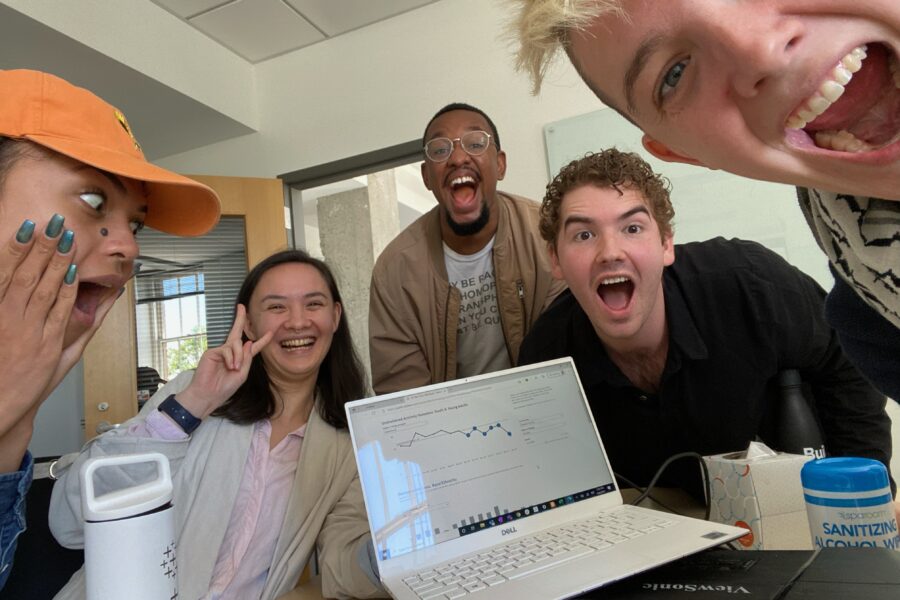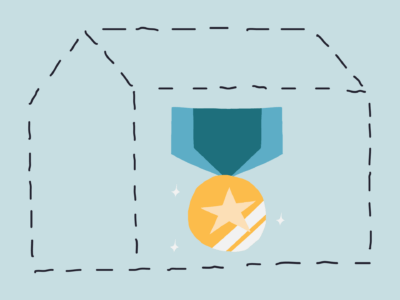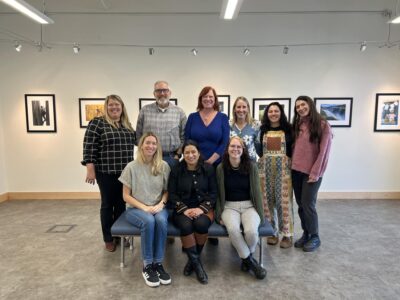Spokane has become the first community in Washington state to measurably and sustainably reduce youth and young adult (YYA) homelessness as a part of A Way Home Washington’s Anchor Community Initiative. In December 2020, there were 270 YYA actively experiencing homelessness — which includes youth living unsheltered — but by June 2021, the number had dropped to 217. What’s more, between September 2020 and June 2021, Spokane decreased unsheltered YYA homelessness by over 50%.
To be confident a homelessness system has fundamentally changed, a community needs to have driven the number of people experiencing homelessness below their median for six consecutive months, demonstrating a shift and a measurable, meaningful reduction.
Shifts are important milestones on the journey to reaching functional zero for a population.
Spokane is part of A Way Home Washington (AWHWA), a statewide movement to prevent and end youth and young adult homelessness, with a focus on prioritizing young people of color and LGBTQ+ youth. This focus is critical, because youth of color and LGBTQ+ youth experience homelessness at higher rates than their white, straight, cisgender peers. AWHWA’s flagship Anchor Community Initiative (ACI) supports communities to accurately know all of the unaccompanied youth and young adults (YYA) aged 12-24 experiencing homelessness and housing instability, using that data to make systems changes needed to end, not just manage, YYA homelessness by reaching functional zero.
For Anchor Communities to reach functional zero, they must be able to house all the young people coming into their system in 30 days or less, have zero unsheltered young people, and have fair outcomes for youth of color, LGBTQ young people, and trans and gender nonconforming young people.
“Our community is really excited to have found efficacy in this process. It is often hard to see the impact of this work, outside of examples within each provider’s experience,” said Julius Henrichsen, ACI Coordinator.
“With the tools and support that AWHWA has brought into Spokane, we have been able to coordinate community-wide changes more effectively, and to also see the impact that we can make when we work collectively.”
Along with being an Anchor Community, Spokane is also part of the Built for Zero movement, and the teams have collaborated while working to end homelessness across different populations.
System improvements supporting the shift
The Spokane AWHWA team reached their 20% reduction milestone through successful tests of change ideas and strong data quality, which helped improve their homeless response system. As a highly collaborative community of practice, Spokane adopted an all-hands-on-deck approach to ending, not just managing, youth and young adult homelessness.
“There’s a willingness to dive deeply into local data through the youth by-name list — and the skills and tools to do so,” said Cecily Ferguson, ACI Coaching and Improvement Manager at AWHWA and previous ACI Coordinator in Spokane.
“Curiosity leads to tests of change and reflection, which has ultimately empowered our community to identify and advocate for system improvements that reduce the numbers of YYA experiencing homelessness,” Ferguson said.
Case conferencing
In January 2020, the Spokane team held case conferencing meetings twice a month, but by November, they increased the frequency to weekly meetings. Led by Julius Henrichsen, ACI Coordinator, the case conferencing team began alternating the priorities of the weekly meetings between unsheltered and Queer, Trans, Black, Indigenous, Youth of Color (QTBIPOC), leading to new system insights like locations of gaps in street outreach efforts.
“Case conferencing has been a really impactful addition to our local tool kit for direct service providers,” Henrichsen said.
“This space has served as an opportunity for participating staff to coordinate on a community-wide scale, sharing resource ideas, getting to know each other in a more collaborative environment, and in some instances even discovering that they are serving the same young person,” Henrichsen said.
By having a robust case conferencing practice, participating providers could clean up their by-name list data, update their touchpoints with clients, and address data collection issues in real-time as a result of the increased frequency of the meetings.
Data management and collection
Innovations with ways to both collect and manage data also contributed to the community reaching their reduction goal. The team created a logic flow with every possible scenario a young person entering and exiting HMIS could experience, which has since been adapted to improve other Anchor Communities’ data transformation processes and to help jumpstart national youth by-name list efforts.
Another significant way the community improved their system was by beginning to collect system-wide sexual orientation data for youth and young adults, which has allowed them to reduce disproportionate outcomes for queer YYA. The team also developed an innovative outreach program, called InReach, aimed at directly and sustainably connecting the homelessness system with other local systems of care, like schools and inpatient behavioral health centers.
Centralized Diversion Fund
Spokane has identified the creation of the Centralized Diversion Fund in August 2020 as a major factor in their success. A core component of AWHWA’s strategy to end youth and young adult homelessness, diversion is aimed at assisting individuals or households to quickly secure housing outside of the homeless response system.
In partnership with the Office of Homeless Youth, the Centralized Diversion Fund provides flexible funding to eliminate barriers for youth and young adults to safe and stable housing outside of the homelessness system, including for YYA at risk of homelessness or who are unstably housed. Young people can access this fund at their college, mental health provider or LGBTQ+ center without ever needing to make direct contact with the homeless system. Together, the young person and trained provider tailor strategies that lead to safe and stable housing, coupled with one-time financial assistance when needed.
Youth Advisory Board
All of the community’s improvement efforts have been informed by the creation of a Youth Advisory Board, in which young people with lived expertise work with partners to provide ACI team members feedback, input, and ideas for system changes.
In February 2021, the Youth Advisory Board was successful in advocating locally for Spokane’s first young adult shelter. The Board subsequently worked with Volunteers of America to identify and implement policies and rules for the shelter. The Youth Advisory Board also helped develop a coordinated housing search assistance program for youth and young adults in collaboration with several other programs in the system.
Looking ahead
After achieving this reduction, the Spokane team’s next goal is to continue focusing on reducing the number of young people experiencing active homelessness and to increase the housing placement rate for youth and young adults system-wide (and specifically coming out of rapid rehousing/transitional housing interventions).
“No matter where our expertise is derived from, we are ensuring that the support requested by the young people in our community is available,” Henrichsen said. “And we are doing it together.”




